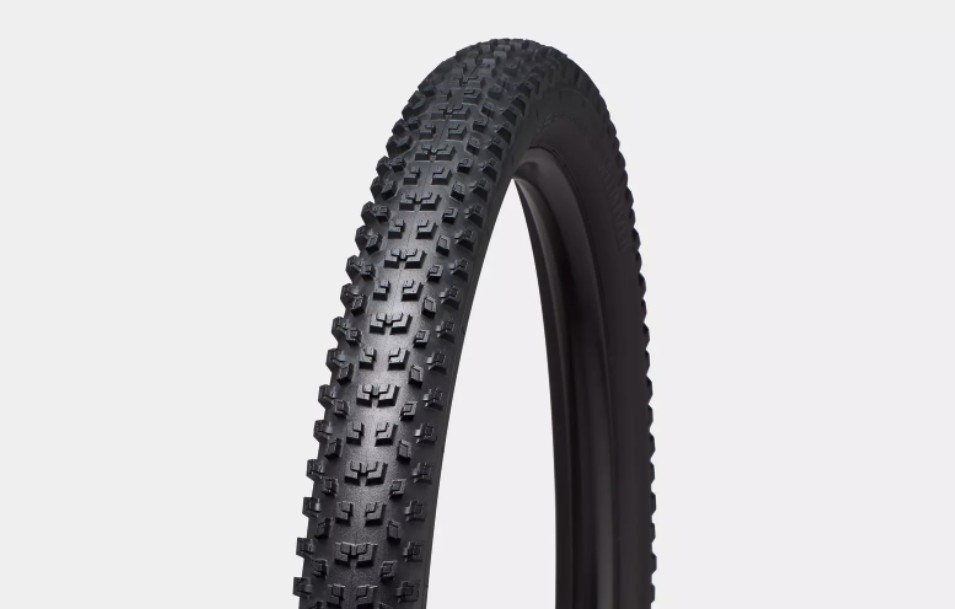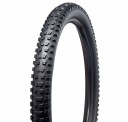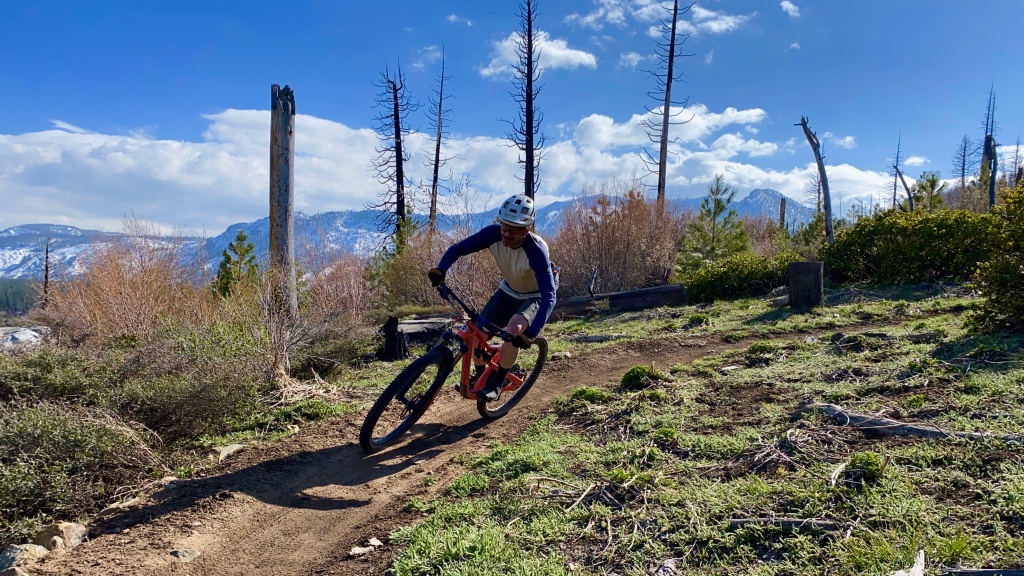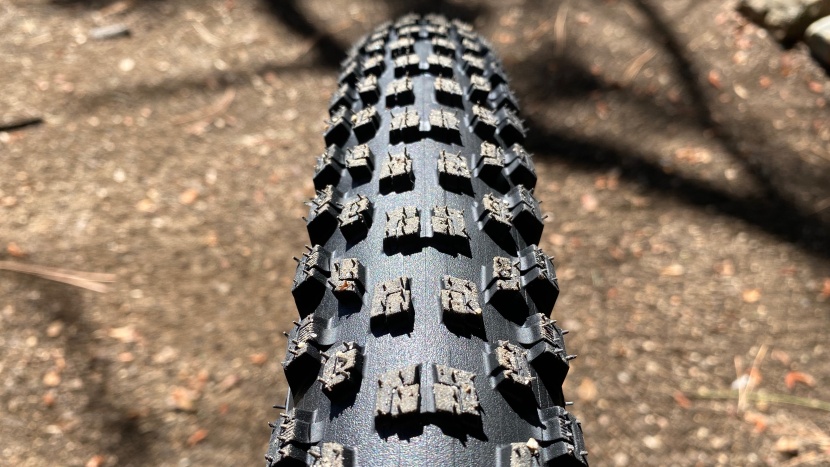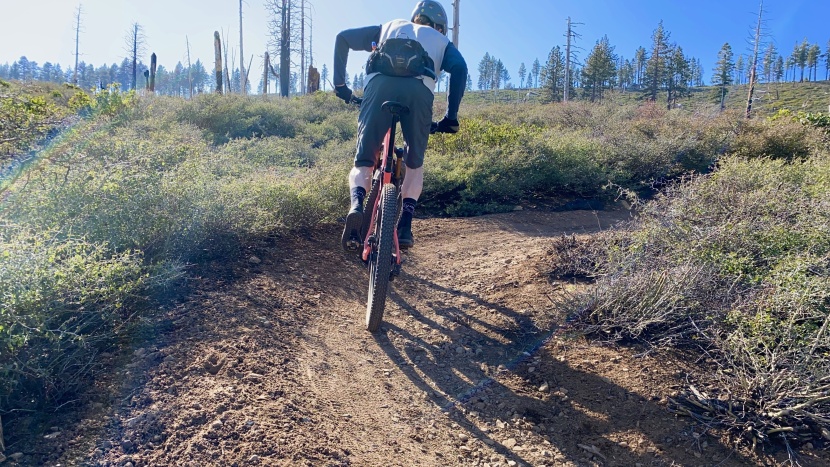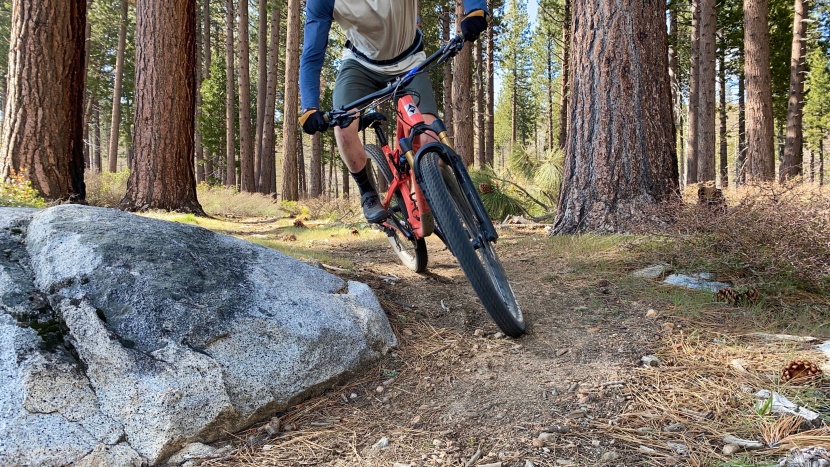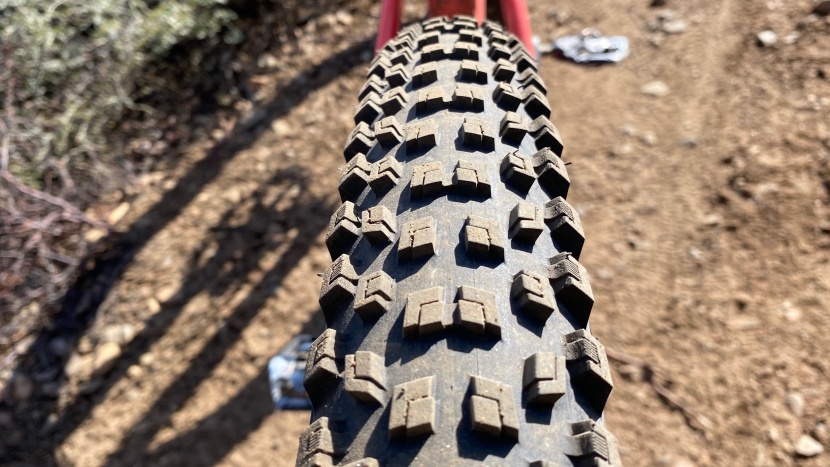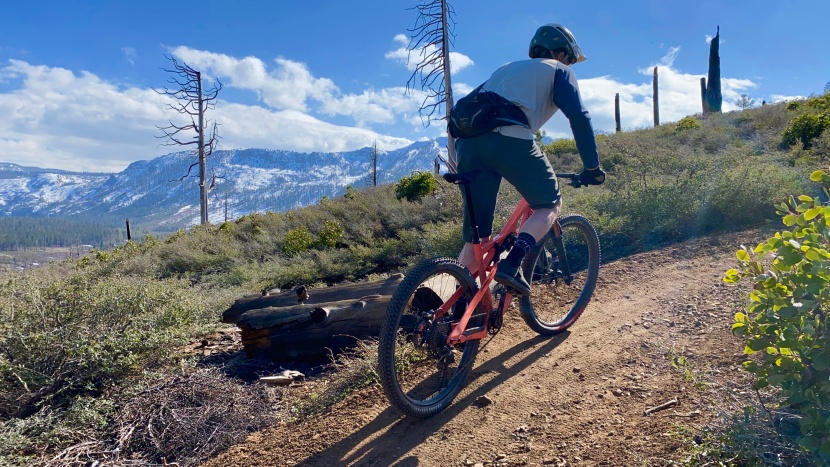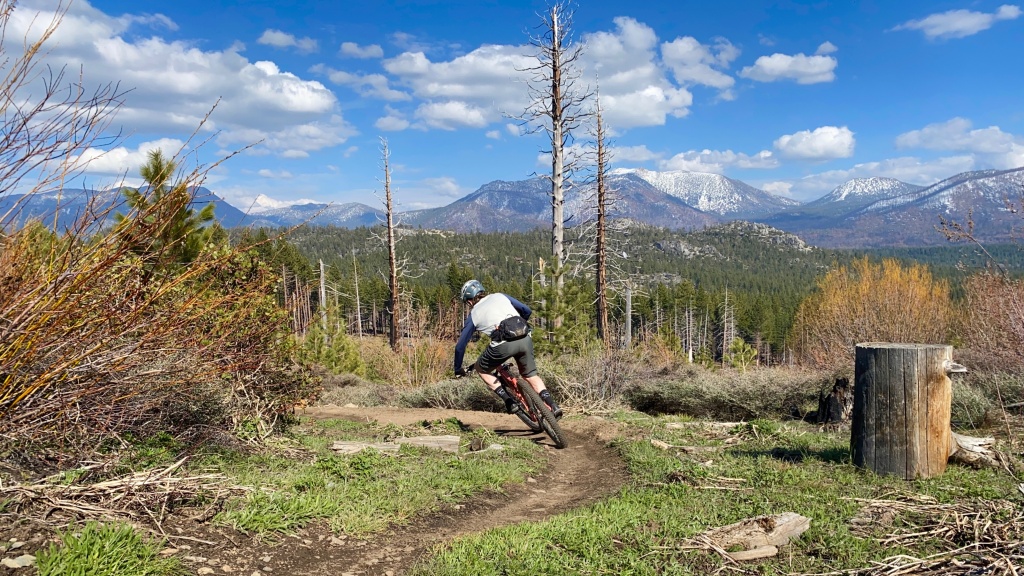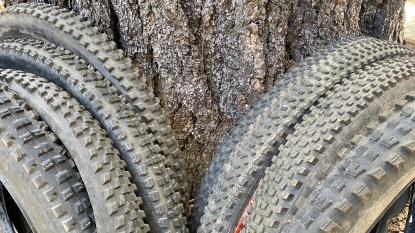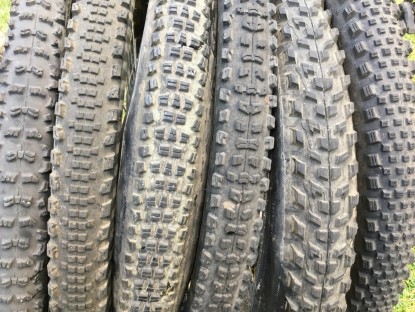Specialized Ground Control Grid T7 Review
Our Verdict
Compare to Similar Products
 This Product
Specialized Ground Control Grid T7 | |||||
|---|---|---|---|---|---|
| Awards | Best for XC Trail Riding | Best Bang for the Buck Front Tire | Another Great Aggressive Front Tire | Best Bang for the Buck Rear Tire | |
| Price | $39.99 at Evo Compare at 2 sellers | $65 List $66.95 at Amazon | $70 List $69.99 at Backcountry | $64.99 at Amazon Compare at 3 sellers | $69.99 at Evo Compare at 2 sellers |
Overall Score  |
|||||
| Star Rating | |||||
| Bottom Line | Lightweight, fast-rolling, and grippy, this is a great option for aggressive cross-country and light trail riding | A durable rear tire suited for aggressive trail riding in a range of conditions | Same great value, but improved grip and performance with a new rubber compound | A great front tire for aggressive trail riding in mixed conditions | A versatile semi-aggressive rear tire with well-rounded performance and a reasonable price |
| Rating Categories | Specialized Ground... | Continental Kryptot... | Specialized Butcher... | Continental Kryptot... | Specialized Elimina... |
| Cornering (25%) | |||||
| Pedaling Traction (20%) | |||||
| Braking Traction (20%) | |||||
| Rolling Resistance (15%) | |||||
| Longevity (15%) | |||||
| Installation (5%) | |||||
| Specifications | Specialized Ground... | Continental Kryptot... | Specialized Butcher... | Continental Kryptot... | Specialized Elimina... |
| Size tested | 29" x 2.35" | 27.5" x 2.4" | 29" x 2.6" | 27.5" x 2.4" | 29" x 2.3" |
| Weight as tested | 867g | 1046g (27.5) | 1123g | 1012g (27.5) | 945g |
| Front, Rear, or Both | Both | Rear | Front, Both | Front | Rear |
| Casing Tested | GRID | Trail | GRID Trail | Trail | GRID Trail |
| Compound Tested | Gripton T7 | Endurance | Gripton T9 | Endurance | Gripton T7 |
| Bead | Folding | Folding | Folding | Folding | Folding |
| Tread Count (TPI) | 60 | 60 | 60 | 60 | 60 |
Our Analysis and Test Results
Specialized has really stepped up their tire offerings in recent years with fresh rubber compounds and tread patterns across their range. The Ground Control Grid T7 is one of the tires that has gotten a major overhaul. While it is technically considered a cross-country tire, it comes with the slightly more robust Grid casing and a fairly aggressive tread pattern that makes it a bit more versatile and robust than a typical XC tire. Down-country is a (somewhat cringe-worthy) term that has been coined to categorize the new breed of bikes that have cross-country weight and travel numbers combined with more aggressive geometries, making them impressively versatile and capable of riding a huge variety of terrain, and the Ground Control seems very well suited to that market. We tested it head to head against a very similar tire and came away quite impressed by its performance.
Cornering
If there's one thing we've come to expect over the years, it's that lightweight cross-country tires don't usually provide the most confidence-inspiring grip when cornering. So, we approached the first few corners cautiously on the Ground Control but quickly learned to reset our expectations of what these tires could do. Both as a front and a rear tire, we found ourselves impressed by the predictable and trustworthy cornering grip they provided, particularly when compared to other tires in the same category.
Obviously, these tires don't necessarily corner like a big meaty trail tire with a more aggressive tread, but they really did pleasantly surprise us. There are a number of reasons, and it really starts with the size of the knobs and the tread pattern. While not huge by any means, the knobs are a bit taller and blockier than what you'll find on similar tires allowing them to better penetrate into loose soils. Specialized has also used what they call a Block-In-Block design with a taller inner block to “pierce the ground and claw for traction” with an outer structure that “supports the inner block for additional speed, traction, support, and stable handling”. This block-in-block design is clearly visible when looking at the knobs, and while we can't verify the validity of their claims, we did find these tires to provide confidence when tipped on edge with no real squirming or vagueness to the feel. The knobs are fairly tightly packed, but there's still plenty of room between them for each to function independently.
Specialized employs their T7 rubber compound on the Ground Control Grid. This rubber compound falls in between the firmer T5 and the softer T9, hitting the middle ground of tackiness, damping, and rolling speed. Another factor at play here is the sheer number of tread knobs. While the tire has a generally round side-to-side profile, it is packed with knobs in the center, intermediate zone, and, of course, there's a fairly substantial row of slightly staggered rectangular cornering knobs. So, not only does it roll very smoothly and naturally on edge, but it also hooks up throughout the spectrum of lean angles. The GRID casing is supportive enough to prevent squirm and tire roll, yet supple enough to conform well to the trail surface for a larger contact patch. Sure, you can probably get these tires to roll and maybe even burp if you're slashing hardpack berms at full speed, but we did not find that to be an issue in most everyday riding scenarios.
Pedal Traction
When used as a rear tire, the Ground Control T7 provides great climbing traction on a range of surfaces and conditions. This is a result of its taller tread knobs, compared to other cross-country tires, that can penetrate and grip on everything from firm to moderately loose conditions. We found ourselves quite impressed, especially considering how fast this tire rolls.
To test pedaling traction, we rode up trails with a wide range of soil conditions. In loose soils, it was immediately noticeable how well these tires were hooking up, particularly when climbing out of the saddle. Where other similar tires were prone to slipping and even spinning out, the Ground Control locked in and kept propelling us forward. We credit the knob height, sharper edges, and moderate spacing between them for providing such good grip in these situations. Similarly, in chunky soils and rock gardens, we found them to find grip where others faltered for the same reasons. The height, shape, and spacing of the knobs worked very effectively to grab onto things and maintain forward progress.
Braking Traction
Once again, the Ground Control T7 exceeded our expectations in the braking traction department. No, they don't slow you down as effectively as a chunky enduro or aggressive trail tire, but we found them to slow us down in a predictable fashion, and they were far less likely to break into a skid than comparable tires.
When discussing the braking traction of the Ground Control, it's important to note that it is in the context of lighter weight cross-country tires. They definitely hold their own compared to some lower-profile and faster-rolling trail riding tires, but you're always going to compromise a little for huge advantages elsewhere. Regardless, we found them to have a very predictable and confidence-inspiring feel in most conditions, and they really only faltered in super loose conditions. Once again, this is primarily a function of the slightly taller knobs and squared-off braking edges, as well as the sheer number of knobs available to grab hold of the trail surface when the brakes are applied.
Rolling Resistance
The Ground Control is certainly a fast-rolling tire. It may not be the absolute fastest we tested, but it's pretty darn close, and it's even more impressive given the higher levels of cornering, braking, and pedaling traction it provides compared to other tires in its category. Its relatively light weight is also a factor, as it reduces the overall weight of your bike and the rotational mass, giving it a quick and nimble feel.
Switching from heavier, chunkier tires to the Ground Control, the difference in rolling resistance is immediately apparent. Despite the “aggressive for an XC tire” tread, the knobs are packed fairly tight with slight ramps on the center and intermediate knobs, and they roll very smooth and quiet over everything from pavement to singletrack. Sure, some tires with even lower profile treads and lighter weights will roll slightly faster, but they won't provide you with the same level of traction and performance in loose conditions. With a measured weight of just 867-grams (a few grams heavier than the claimed weight of 845-grams) for our 29" x 2.35" test tire, they also just feel light and quick. Unlike heavier tires that can feel a bit draggy with more rotational weight, the Ground Control doesn't bog you down. When accelerating out of a turn or grinding up a long climb, the reduced weight is very noticeable.
Longevity
When kept within its terrain limits, we feel the Ground Control Grid T7 should have a reasonable lifespan. Specialized's T7 rubber compound falls just below the tackier and softer T9 compound, and it provides a good blend of grip and longevity. It seems to wear at a moderate pace, and we didn't notice any premature deterioration of the side knobs during testing or anything that would point to the tread breaking down more quickly than expected. Of course, this will vary somewhat from front to rear as rear tires tend to take a bit more abuse, but that is typical of any tire.
Our biggest concern is the durability of the Grid casing. While it is a little more robust than most true cross-country tires, it is still relatively lightweight and thin compared to burlier trail tires. It has the same construction as the lighter Control casing tires, but with additional panels in the sidewalls from the bead to the tread for increased puncture, tear and pinch flat resistance. We did not experience any punctures or sidewall damage during our test period as we did on similar tires, but we also didn't take the Ground Control tires too far out of their element. We definitely rode some moderately chunky trails and loose conditions, but given the purpose of these tires, we didn't go thrashing them down the roughest trails in our area. If you ride super rough trails with lots of sharp rocks, we could see the Grid casing being fairly easy to puncture or pinch flat. We have experience riding other Specialized tires with the Grid casing and have definitely done some damage to most of them.
Installation
The Ground Control T7 tires proved to be about average for installation. We found them to have a fairly tight fit on our test rims and we used a tire lever to ease the last bit of the bead over the rim. Once on the rim, we were able to inflate them with just a standard floor pump. That said, we are using the new Reserve Fillmore valves that allow air to pass through them more easily than a standard Presta valve, so that could have something to do with it. Either way, installing these tires wasn't difficult.
Value
Specialized makes some of the most affordable tires on the market, and the Ground Control T7 is no exception. If you're looking for a lightweight tire to span cross-country and light trail riding duties, not only do we think this is one of the best options out there, but it's also one of the best values.
Conclusion
In the ever-changing world of mountain bikes, Specialized continues to have their finger on the pulse and the Ground Control Grid T7 is a fine example of that. By combining cross country weight with a trail-worthy casing and highly versatile tread design, they have created a very impressive tire to meet the demands of the growing down-country segment. If you're an aggressive cross-country rider or a trail rider who values light weight and doesn't frequent the chunkiest trails, we think you should give these tires a shot.
Other Versions
Specialized makes the Ground Control Grid T7 in multiple sizes. For 29-inch wheels, they come in 2.35" (tested) and 2.2" widths. For 27.5-inch wheels, they are offered in 2.35", 2.6" and 3" widths. They even make it in 2.35" width for 26-inch wheels.
Specialized also makes them with a tan sidewall in the 29" x 2.35" size, with proceeds benefitting the Soil Searching program which supports trail builders, trail maintenance, and trail development.

